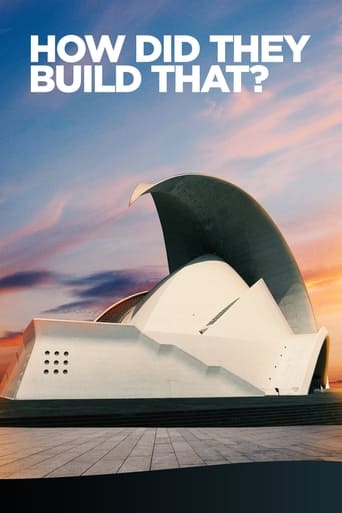
Rating:
6/10 by 1 users
How Did They Build That? (2021)
An exploration of how some of the world's biggest man-made structures were built.
Writing:
Release Date:
Sun, Jan 03, 2021
Country: US
Language: En
Runtime: 43
Country: US
Language: En
Runtime: 43
Jay Ellis
Self - Host
Season 3:

A sculptural new transportation hub for New York's World Trade Center is beset by challenges. Then, Amsterdam gains a striking building inspired by a mountain valley, and a new launchpad for space travel prepares for liftoff.

A gravity defying university building in Sydney, Australia, is clad in 320,000 bricks. Engineers grapple with making an angular arts center tornado proof in Oklahoma. And a plant-filled office building.

Engineers grapple with an apartment building, ripped apart by a man-made canyon. The iconic Gateway Arch takes shape in St Louis, Missouri. And an unpromising plot in Copenhagen is transformed by a gleaming new triangular office building.

A dazzling new 1400 foot tapering skyscraper is built right next to New York's Grand Central. A curving wine museum requires ingenious engineering in Bordeaux, France. And possibly the world's most glamorous parking garage.

A 1.2 million square foot office building balances precariously on a 39 foot wide base in Chicago. A building named Pterodactyl lands on top of a Los Angeles parking garage. And the world's longest suspension footbridge is constructed in Czechia.

A new Olympic and Paralympic museum tests engineers with its trailblazing accessible design. A dazzling curved glass skyscraper battles gravity in Milan. And a student center built under a noisy railroad.

Architects and engineers build an eco-friendly convention center on Vancouver's waterfront, a lift bridge in Bordeaux and a cocoon-shaped skyscraper in Tokyo each with unique challenges like marine habitats and massive spans.

A sculptural high-rise with rippling balconies breaks the mold in Chicago. Mammoth machines bore 26 miles of tunnels for an underground railroad beneath London's city streets.

A new performance center with a tent-like glass-and-steel lobby tests engineers in Kansas City; two twisting apartment towers make heads spin in Ontario.

The American Museum of Natural History gets a cave-like extension; Boston University gains a tower.


